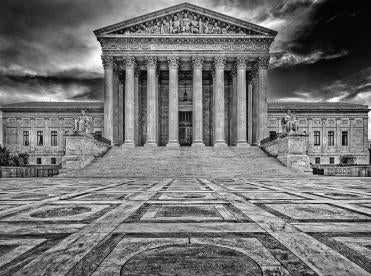The U.S. Supreme Court yesterday agreed to hear one of two high-profile cases that involve the federal Trademark Act’s ban on registration of “disparaging” trademarks.
The case is called In re Tam, and involves a music group comprised of Japanese American men who named themselves “The Slants.” The group applied to register their name as a trademark and the Trademark Office refused, finding that the term was disparaging to persons of Japanese extraction. The refusal was based on Section 2(a) of the Trademark Act, which provides for denial of registration to material that
…consists of or comprises immoral, deceptive, or scandalous matter; or matter which may disparage or falsely suggest a connection with persons, living or dead, institutions, beliefs, or national symbols, or bring them into contempt, or disrepute…
Last December, the United States Court of Appeals for the Federal Circuit, in a 9-3 decision, overruled the Trademark Office’s refusal to register “The Slants” as a trademark, finding Section 2(a) to be in violation of the First Amendment:
Whatever our personal feelings about the mark at issue here, or other disparaging marks, the First Amendment forbids government regulators to deny registration because they find the speech likely to offend others. Even when speech “inflict[s] great pain,” our Constitution protects it “to ensure that we do not stifle public debate.”
The Trademark Office asked the Supreme Court to review the Federal Circuit’s decision in In re Tam, no doubt seeking clarification of the precise scope of the “disparagement” provision of Section 2(a) (more on that in a moment). Shortly thereafter, Pro-Football, Inc., the petitioner in the other high-profile disparagement case – the one involving the cancellation of six registrations for trademarks used by the Washington Redskins football team – took the unusual step of asking the Supreme Court to hear its appeal at the same time.
The Supreme Court accepted The Slants’ invitation but declined Pro-Football’s, most likely because the Redskins case had not yet been heard by the Court of Appeals and thus was not considered ripe for Supreme Court review. Even so, the Supreme Court’s decision in In re Tam will undoubtedly have implications for the Redskins case – though precisely what those implications are isn’t entirely clear.
Obviously, if the Supreme Court reverses the Federal Circuit and upholds the constitutionality of Section 2(a), that would deal a serious blow to the Redskins’ hopes.
But even if the Supreme Court follows the Federal Circuit’s lead and invalidates the “disparagement” provision on First Amendment grounds, that might not help the Redskins’ cause as much as one might think.
This is because First Amendment jurisprudence recognizes that there are different kinds of speech, which are entitled to different levels of protection. The Slants claim that they chose their name precisely because it was frequently used as a slur against Japanese-Americans, in a deliberate effort to “reclaim” the term – much as African-Americans once did with “black,” and as the homosexual community did with “gay.” As such, they argued, their choice of the name was political speech, entitled to the highest level of First Amendment protection. Pro-Football may have a hard time persuading courts that using “Redskins” as a team nickname rises to the same level. If their use of the term is characterized as mere “commercial” speech, the level of First Amendment protection drops precipitously.
It is important to note that the Supreme Court could sidestep this complexity altogether and find Section 2(a) unconstitutional without relying on the First Amendment at all. The Court generally tries to base its decisions on the narrowest available grounds. One option in In re Tam would be to invalidate Section 2(a) on the grounds that it is “void for vagueness” – i.e., that the statutory language makes it impossible for courts, or anyone else, to be confident about precisely what is allowed and what is not.
A concurring opinion in the Federal Circuit’s In re Tam decision took precisely this approach, noting that Section 2(a) precludes registration of any mark that “may disparage” persons, institutions, or beliefs. The word “disparage” has a wide range of dictionary definitions, none of which is specified by the statute, leaving the Trademark Office with no clear guidance as to whether a term is “disparaging.” It is hard to imagine how a trademark owner might be able to anticipate whether the Trademark Office would find that a particular term “may” be disparaging.
If the Supreme Court adopts that view, not only do The Slants win, but the Redskins’ lawyers can pack up their briefcases and go home.




 />i
/>i
